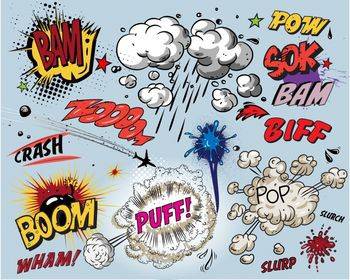What’s the French for Woof?
Rise and shine! The birds are tweeting, the ducks are quacking, the cows are mooing and the dogs are…gav gav…hold on, I get ahead of myself sometimes. I should start with a brief introduction to onomatopoeia.
This ‘onomatopoeia’ is what refers to words that represent sounds. These sounds don’t have to be animal noises as I demonstrated, but can be the sounds of anything that happens to, well, make a sound.
The air around you can ‘flutter,’ ‘swish,’ ‘swoosh,’ or ‘whip’; too much wind and you might fall and ‘bang’ your head; let out a ‘screech’ and ‘thump’ your hand to the ground, while everyone else ‘claps’ at your unfortunate accident. It’s okay though: get up, grab a drink and ‘gurgle’ it down, let out a ‘belch’ and all’s well, you can go back and ‘chatter’ with your pals.

“Wait” you say, “when will he tell me what on earth ‘gav gav’ is?” Right, I’m on it! ‘Gav gav’ is the sound a dog makes in Russian. “That’s crazy! Dogs bark, make a ‘ruff ruff’ or ‘woof’ sound,” I hear you cry. You are correct — in English they make those sounds, but in Russia dogs speak another language. Danish dogs say ‘vov-vov,’ while Dutch dogs ‘waf waf,’ Finnish ‘hau hau,’ French ‘ouah ouah,’ Japanese ‘wan wan,’ and Turkish ‘hauv hauv.’
“Amazing” you say, “are there multilingual dogs too?” No, that’s absurd. What is happening here is that people of different languages have different ways of describing the sounds they hear; in English we hear babies crying as ‘wahwah’.
It seems logical to write the word as we hear it, and most other languages follow that principle. In German there is ‘wäh wäh,’ in Mandarin ‘wā wā,’ and in Bulgarian ‘yaaaaa yaaaaa,’ for example. In some languages however the spelling can appear less obvious to an English speaker: in French it is ‘ouin ouin,’ Finnish ‘byääh,’ while in Catalan it’s ‘anguéé’.
The ‘ticking’ of time in English is most often ‘tick tock,’ whereas in Japanese it is ‘katchin katchin,’ which to us might sound more like ‘ka-ching ka-ching’ as we spend our hard earned cash. Let’s say I ‘crash’ into the car of a Frenchman, he might ‘tut-tut’ his horn, as the heart of my Dutch friend in the backseat races ‘boenk boenk.’ An Italian cop then pulls over with his siren singing ‘nino nino’ and I get out to explain myself when a Spanish dog bites me: ‘chac!’
No, it doesn’t sound like a good day, but there is a lesson to be learnt; despite being one of the more overlooked aspects of language learning, these onomatopoeias are still important, and are of indispensable help when trying to explain to a Japanese doctor how a dog ‘gari gari’ your hand.
Can you think of any other onomatopoeias that make you ‘ha ha’ or ‘hmmm’?
